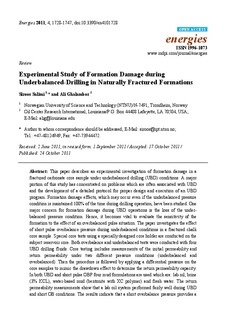| dc.contributor.author | Salimi, Siroos | |
| dc.contributor.author | Ghalambor, A | |
| dc.date.accessioned | 2015-09-30T07:42:33Z | |
| dc.date.accessioned | 2015-10-28T09:17:05Z | |
| dc.date.available | 2015-09-30T07:42:33Z | |
| dc.date.available | 2015-10-28T09:17:05Z | |
| dc.date.issued | 2011 | |
| dc.identifier.citation | Energies 2011, 4(10):1728-1747 | nb_NO |
| dc.identifier.issn | 1996-1073 | |
| dc.identifier.uri | http://hdl.handle.net/11250/2358230 | |
| dc.description.abstract | This paper describes an experimental investigation of formation damage in a
fractured carbonate core sample under underbalanced drilling (UBD) conditions. A major
portion of this study has concentrated on problems which are often associated with UBD
and the development of a detailed protocol for proper design and execution of an UBD
program. Formation damage effects, which may occur even if the underbalanced pressure
condition is maintained 100% of the time during drilling operation, have been studied. One
major concern for formation damage during UBD operations is the loss of the underbalanced
pressure condition. Hence, it becomes vital to evaluate the sensitivity of the
formation to the effect of an overbalanced pulse situation. The paper investigates the effect
of short pulse overbalance pressure during underbalanced conditions in a fractured chalk
core sample. Special core tests using a specially designed core holder are conducted on the
subject reservoir core. Both overbalance and underbalanced tests were conducted with four
UBD drilling fluids. Core testing includes measurements of the initial permeability and
return permeability under two different pressure conditions (underbalanced and
overbalanced). Then the procedure is followed by applying a differential pressure on the
core samples to mimic the drawdown effect to determine the return permeability capacity.
In both UBD and short pulse OBP four mud formulations are used which are: lab oil, brine
(3% KCL), water-based mud (bentonite with XC polymer) and fresh water. The return
permeability measurements show that a lab oil system performed fairly well during UBD
and short OB conditions. The results indicate that a short overbalance pressure provides a significant reduction in permeability of the fractured formations. In most tests, even
application of a high drawdown pressure during production cannot restore the initial
permeability by more than 40%. | nb_NO |
| dc.language.iso | eng | nb_NO |
| dc.publisher | MDPI | nb_NO |
| dc.title | Experimental Study of Formation Damage during Underbalanced-Drilling in Naturally Fractured Formations | nb_NO |
| dc.type | Journal article | nb_NO |
| dc.type | Peer reviewed | en_GB |
| dc.date.updated | 2015-09-30T07:42:33Z | |
| dc.source.volume | 4 | nb_NO |
| dc.source.journal | Energies | nb_NO |
| dc.source.issue | 10 | nb_NO |
| dc.identifier.doi | 10.3390/en4101728 | |
| dc.identifier.cristin | 869179 | |
| dc.description.localcode | This is an open access article distributed under the Creative Commons Attribution License which permits unrestricted use, distribution, and reproduction in any medium, provided the original work is properly cited. | nb_NO |
